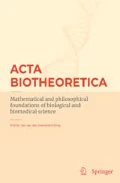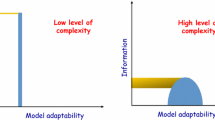Summary
The fundamental concepts of the theory of knowledge ofKant—“transzendental”, “apriori”, and “aposteriori”, “konstitutiver” and “regulativer Vernunftgebrauch”, “Ding an sich”, “Erkenntnisvermögen”, etc.—are exemplified and examined by the modern theory of axiomatics. Therefrom essential consequences result in respect of modern theoretical biology as well as the elimination of usual misunderstandings about the relation between physics and biology in the philosophical system ofKant. The usual view thatKant would have admitted to physics only the causal-constitutive method of thinking, and on the contrary would have admitted to biology merely a teleologic-regulative process, has to be rejected being entirely erroneous. — Then the theory of the “Ding an sich” is interpreted metabiologically, not metaphysically and finallyKants terminology of knowledge is explained biologically.
Résumé
Les notions fondamentales de la théorie de connaissance deKant — „transzendental”, „apriori” et „aposteriori”, „konstitutiver” et „regulativer Vernunftgebrauch”, „Ding an sich”, „Erkenntnisvermögen” etc. — sont mises en évidence et examinées par la théorie de l'axiomatique moderne. De là s'ensuivent des conséquences essentielles pour la biologie théorique moderne, ainsi que la suppression de malentendus en égard au rapport de la physique et de la biologie dans le système philosophique deKant. L'interprétation usuelle, selon laquelleKant aurait voulu accorder le raisonnement causal-constitutif à seule la physique, et, au contraire, n'aurait voulu accorder qu'un procédé téléologique-régulatif à la biologie, doit être rejetée comme étant entièrement erronnée. Ensuite, la doctrine de la „Ding an sich” est interprétée métabiologiquement au lieu de métaphysiquement, et enfin, la terminologie de la connaissance deKant est expliquée biologiquement.
Similar content being viewed by others
Literaturverzeichnis
Baer, Karl Ernst von (1864). Reden geh. in wissenschaftl. Versammlungen und kleinere Aufsätze vermischten Inhalts. Tl 1: Reden. - St. Petersburg.
Kant, Immanuel. Kritik der reinen Vernunft. Ausgabe von K.Kehrbach. - Leipzig, Philipp Reclam. (Kr. d. r. V.)
- (1793). Kritik der Urteilskraft. 2. Aufl. (Kr. d. U.)
- (1922). Kritik der Urteilskraft. Hrsg. von O.Buek in der Ausgabe vonCassirer.
-Kant, Immanuel Prolegomena zu einer jeden künftigen Metaphysik. Ausgabe Reclam. - Leipzig, Philipp Reclam. (Prol.)
- (1791). Grundlegung zur Metaphysik der Sitten. (Metaph. d. Sitten)
Klaauw, C. J. van der (1934). Uitwendige doelmatigheid en einddoel bijKant en in de moderne biologie. (Antrittsvorlesung) - Leiden, E. J. Brill, 42 p.
— (1935). Die Bedeutung der TeleologieKants für die Logik der Ökologie.- Sudhoffs Arch. Gesch. Med. XXVII, p. 516–588.
Meyer-Abich, Adolf (1934a). Ideen und Ideale der biologischen Erkenntnis. Beiträge zur Theorie und Geschichte der biologischen Ideologien. (Bios I) - Leipzig, J. A. Barth, xiv + 202 p.
— (1934b). Die Axiome der Biologie. - Nova Acta Leop. Carol., N. F., I, p. 474–551.
Meyer-Abich, Adolf (1942). Beiträge zur Theorie der Evolution der Organismen. I. Das typologische Grundgesetz und seine Folgerungen für Phylogenie und Entwicklungsphysioloigie. - Erscheint demnächst in Acta biotheor. VII.
Müller, Johannes (1826a). Zur vergleichenden Physiologie des Gesichtssinnes des Menschen und der Thiere. - Leipzig.
- (1826b). Über die phantastischen Gesichtserscheinungen. - Coblenz.
Petersen, Hans (1937). Die Eigenwelt des Menschen. (Bios VIII) - Leipzig, J. A. Barth, vi + 28 p.
Uexküll, J. von (1921). Umwelt und Innenwelt der Tiere. 2. Aufl. - Berlin, J. Springer, vi + 224 p.
— (1928). Theoretische Biologie. 2. Aufl. - Berlin, J. Springer, x + 253 p.
Ungerer, Emil (1922). Die TeleologieKants und ihre Bedeutung für die Logik der Biologie. (Abh. theoret. Biol., Heft 14) - Berlin, Borntraeger, v + 135 p.
Weyl, Hermann (1927). Philosophie der Mathematik und Naturwissenschaft. (Handbuch der Philosophie, Abtl'g II)
Wolff, Gustav (1933). Leben und Erkennen. Vorarbeiten zu einer biologischen Philosophie. - München, E. Reinhardt, 442 p.
Author information
Authors and Affiliations
Rights and permissions
About this article
Cite this article
Meyer-Abich, A. Kant und das Biologische Denken. Acta Biotheor 6, 185–211 (1942). https://doi.org/10.1007/BF01603768
Received:
Issue Date:
DOI: https://doi.org/10.1007/BF01603768




